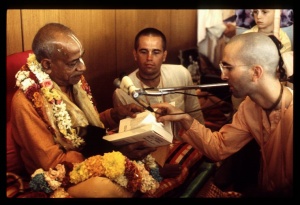SB 1.4.3: Difference between revisions
m (1 revision(s)) |
(Vanibot #0054 edit - transform synonyms into clickable links, which search similar occurrences) |
||
| (One intermediate revision by one other user not shown) | |||
| Line 1: | Line 1: | ||
{{info | {{info | ||
|speaker= | |speaker=Śaunaka Ṛṣi | ||
|listener= | |listener=Sūta Gosvāmī and the Sages | ||
}} | }} | ||
[[Category:Srimad-Bhagavatam - Canto 01 Chapter 04|S03]] | |||
[[Category:Bhagavatam Verses Spoken by Saunaka Rsi - Vanisource|010403]] | |||
<div style="float:left">'''[[Srimad-Bhagavatam]] - [[SB 1|First Canto]] - [[SB 1.4: The Appearance of Sri Narada|Chapter 4: The Appearance of Śrī Nārada]]'''</div> | |||
<div style="float:right">[[File:Go-previous.png|link=SB 1.4.2]] '''[[SB 1.4.2]] - [[SB 1.4.4]]''' [[File:Go-next.png|link=SB 1.4.4]]</div> | |||
{{CompareVersions|SB|1.4.3|SB 1962|SB 1972-77}} | |||
{{RandomImage}} | |||
==== TEXT 3 ==== | ==== TEXT 3 ==== | ||
<div | <div class="verse"> | ||
kasmin yuge pravṛtteyaṁ | :kasmin yuge pravṛtteyaṁ | ||
sthāne vā kena hetunā | :sthāne vā kena hetunā | ||
kutaḥ sañcoditaḥ kṛṣṇaḥ | :kutaḥ sañcoditaḥ kṛṣṇaḥ | ||
kṛtavān saṁhitāṁ muniḥ | :kṛtavān saṁhitāṁ muniḥ | ||
</div> | </div> | ||
| Line 17: | Line 23: | ||
==== SYNONYMS ==== | ==== SYNONYMS ==== | ||
<div | <div class="synonyms"> | ||
''[//vanipedia.org/wiki/Special:VaniSearch?s=kasmin&tab=syno_o&ds=1 kasmin]'' — in which; ''[//vanipedia.org/wiki/Special:VaniSearch?s=yuge&tab=syno_o&ds=1 yuge]'' — period; ''[//vanipedia.org/wiki/Special:VaniSearch?s=pravṛttā&tab=syno_o&ds=1 pravṛttā]'' — was begun; ''[//vanipedia.org/wiki/Special:VaniSearch?s=iyam&tab=syno_o&ds=1 iyam]'' — this; ''[//vanipedia.org/wiki/Special:VaniSearch?s=sthāne&tab=syno_o&ds=1 sthāne]'' — in the place; ''[//vanipedia.org/wiki/Special:VaniSearch?s=vā&tab=syno_o&ds=1 vā]'' — or; ''[//vanipedia.org/wiki/Special:VaniSearch?s=kena&tab=syno_o&ds=1 kena]'' — on what; ''[//vanipedia.org/wiki/Special:VaniSearch?s=hetunā&tab=syno_o&ds=1 hetunā]'' — ground; ''[//vanipedia.org/wiki/Special:VaniSearch?s=kutaḥ&tab=syno_o&ds=1 kutaḥ]'' — wherefrom; ''[//vanipedia.org/wiki/Special:VaniSearch?s=sañcoditaḥ&tab=syno_o&ds=1 sañcoditaḥ]'' — inspired by; ''[//vanipedia.org/wiki/Special:VaniSearch?s=kṛṣṇaḥ&tab=syno_o&ds=1 kṛṣṇaḥ]'' — Kṛṣṇa-dvaipāyana Vyāsa; ''[//vanipedia.org/wiki/Special:VaniSearch?s=kṛtavān&tab=syno_o&ds=1 kṛtavān]'' — compiled; ''[//vanipedia.org/wiki/Special:VaniSearch?s=saṁhitām&tab=syno_o&ds=1 saṁhitām]'' — Vedic literature; ''[//vanipedia.org/wiki/Special:VaniSearch?s=muniḥ&tab=syno_o&ds=1 muniḥ]'' — the learned. | |||
</div> | </div> | ||
| Line 24: | Line 30: | ||
==== TRANSLATION ==== | ==== TRANSLATION ==== | ||
<div | <div class="translation"> | ||
In what period and at what place was this first begun, and why was this taken up? From where did Kṛṣṇa-dvaipāyana Vyāsa, the great sage, get the inspiration to compile this literature? | In what period and at what place was this first begun, and why was this taken up? From where did Kṛṣṇa-dvaipāyana Vyāsa, the great sage, get the inspiration to compile this literature? | ||
</div> | </div> | ||
| Line 31: | Line 37: | ||
==== PURPORT ==== | ==== PURPORT ==== | ||
<div | <div class="purport"> | ||
Because Śrīmad-Bhāgavatam is the special contribution of Śrīla Vyāsadeva, there are so many inquiries by the learned Śaunaka Muni. It was known to them that Śrīla Vyāsadeva had already explained the text of the Vedas in various ways up to the Mahābhārata for the understanding of less intelligent women, śūdras and fallen members of the family of twice-born men. Śrīmad-Bhāgavatam is transcendental to all of them because it has nothing to do with anything mundane. So the inquiries are very intelligent and relevant. | Because ''Śrīmad-Bhāgavatam'' is the special contribution of Śrīla Vyāsadeva, there are so many inquiries by the learned Śaunaka Muni. It was known to them that Śrīla Vyāsadeva had already explained the text of the ''Vedas'' in various ways up to the ''Mahābhārata'' for the understanding of less intelligent women, ''śūdras'' and fallen members of the family of twice-born men. ''Śrīmad-Bhāgavatam'' is transcendental to all of them because it has nothing to do with anything mundane. So the inquiries are very intelligent and relevant. | ||
</div> | </div> | ||
__NOTOC__ | |||
<div style="float:right; clear:both;">[[File:Go-previous.png|link=SB 1.4.2]] '''[[SB 1.4.2]] - [[SB 1.4.4]]''' [[File:Go-next.png|link=SB 1.4.4]]</div> | |||
__NOTOC__ | |||
__NOEDITSECTION__ | |||
Latest revision as of 18:09, 17 February 2024

A.C. Bhaktivedanta Swami Prabhupada
TEXT 3
- kasmin yuge pravṛtteyaṁ
- sthāne vā kena hetunā
- kutaḥ sañcoditaḥ kṛṣṇaḥ
- kṛtavān saṁhitāṁ muniḥ
SYNONYMS
kasmin — in which; yuge — period; pravṛttā — was begun; iyam — this; sthāne — in the place; vā — or; kena — on what; hetunā — ground; kutaḥ — wherefrom; sañcoditaḥ — inspired by; kṛṣṇaḥ — Kṛṣṇa-dvaipāyana Vyāsa; kṛtavān — compiled; saṁhitām — Vedic literature; muniḥ — the learned.
TRANSLATION
In what period and at what place was this first begun, and why was this taken up? From where did Kṛṣṇa-dvaipāyana Vyāsa, the great sage, get the inspiration to compile this literature?
PURPORT
Because Śrīmad-Bhāgavatam is the special contribution of Śrīla Vyāsadeva, there are so many inquiries by the learned Śaunaka Muni. It was known to them that Śrīla Vyāsadeva had already explained the text of the Vedas in various ways up to the Mahābhārata for the understanding of less intelligent women, śūdras and fallen members of the family of twice-born men. Śrīmad-Bhāgavatam is transcendental to all of them because it has nothing to do with anything mundane. So the inquiries are very intelligent and relevant.